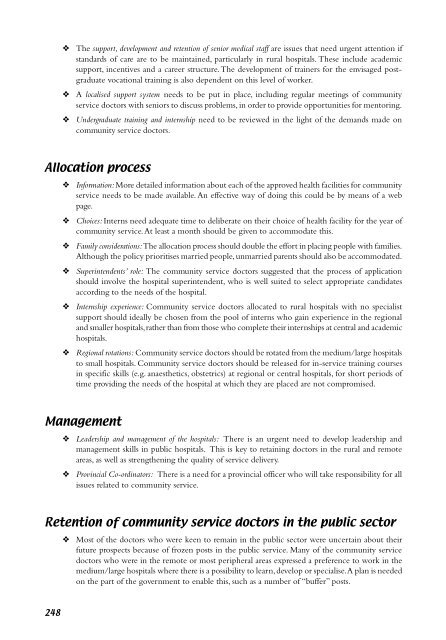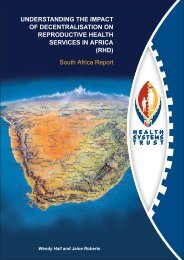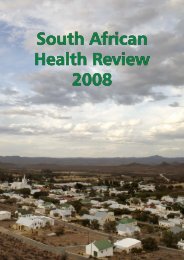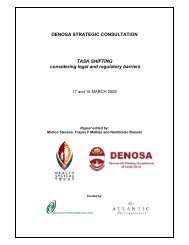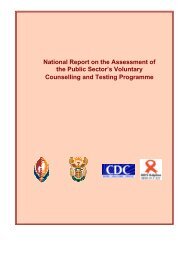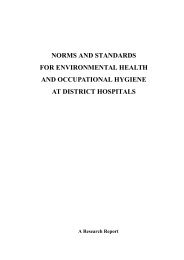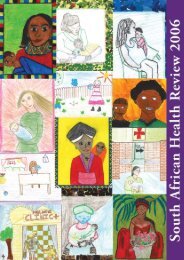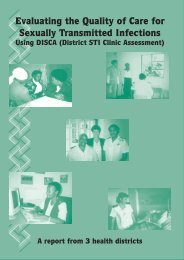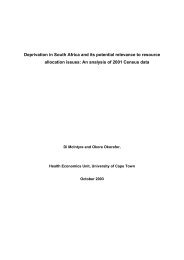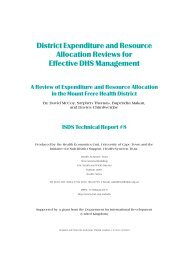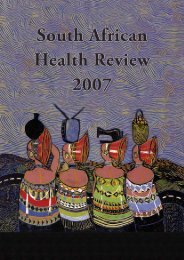Monitoring the implementation of community service
Monitoring the implementation of community service
Monitoring the implementation of community service
You also want an ePaper? Increase the reach of your titles
YUMPU automatically turns print PDFs into web optimized ePapers that Google loves.
248<br />
❖ The support, development and retention <strong>of</strong> senior medical staff are issues that need urgent attention if<br />
standards <strong>of</strong> care are to be maintained, particularly in rural hospitals. These include academic<br />
support, incentives and a career structure. The development <strong>of</strong> trainers for <strong>the</strong> envisaged postgraduate<br />
vocational training is also dependent on this level <strong>of</strong> worker.<br />
❖ A localised support system needs to be put in place, including regular meetings <strong>of</strong> <strong>community</strong><br />
<strong>service</strong> doctors with seniors to discuss problems, in order to provide opportunities for mentoring.<br />
❖ Undergraduate training and internship need to be reviewed in <strong>the</strong> light <strong>of</strong> <strong>the</strong> demands made on<br />
<strong>community</strong> <strong>service</strong> doctors.<br />
Allocation process<br />
❖ Information: More detailed information about each <strong>of</strong> <strong>the</strong> approved health facilities for <strong>community</strong><br />
<strong>service</strong> needs to be made available. An effective way <strong>of</strong> doing this could be by means <strong>of</strong> a web<br />
page.<br />
❖ Choices: Interns need adequate time to deliberate on <strong>the</strong>ir choice <strong>of</strong> health facility for <strong>the</strong> year <strong>of</strong><br />
<strong>community</strong> <strong>service</strong>. At least a month should be given to accommodate this.<br />
❖ Family considerations: The allocation process should double <strong>the</strong> effort in placing people with families.<br />
Although <strong>the</strong> policy prioritises married people, unmarried parents should also be accommodated.<br />
❖ Superintendents’ role: The <strong>community</strong> <strong>service</strong> doctors suggested that <strong>the</strong> process <strong>of</strong> application<br />
should involve <strong>the</strong> hospital superintendent, who is well suited to select appropriate candidates<br />
according to <strong>the</strong> needs <strong>of</strong> <strong>the</strong> hospital.<br />
❖ Internship experience: Community <strong>service</strong> doctors allocated to rural hospitals with no specialist<br />
support should ideally be chosen from <strong>the</strong> pool <strong>of</strong> interns who gain experience in <strong>the</strong> regional<br />
and smaller hospitals, ra<strong>the</strong>r than from those who complete <strong>the</strong>ir internships at central and academic<br />
hospitals.<br />
❖ Regional rotations: Community <strong>service</strong> doctors should be rotated from <strong>the</strong> medium/large hospitals<br />
to small hospitals. Community <strong>service</strong> doctors should be released for in-<strong>service</strong> training courses<br />
in specific skills (e.g. anaes<strong>the</strong>tics, obstetrics) at regional or central hospitals, for short periods <strong>of</strong><br />
time providing <strong>the</strong> needs <strong>of</strong> <strong>the</strong> hospital at which <strong>the</strong>y are placed are not compromised.<br />
Management<br />
❖ Leadership and management <strong>of</strong> <strong>the</strong> hospitals: There is an urgent need to develop leadership and<br />
management skills in public hospitals. This is key to retaining doctors in <strong>the</strong> rural and remote<br />
areas, as well as streng<strong>the</strong>ning <strong>the</strong> quality <strong>of</strong> <strong>service</strong> delivery.<br />
❖ Provincial Co-ordinators: There is a need for a provincial <strong>of</strong>ficer who will take responsibility for all<br />
issues related to <strong>community</strong> <strong>service</strong>.<br />
Retention <strong>of</strong> <strong>community</strong> <strong>service</strong> doctors in <strong>the</strong> public sector<br />
❖ Most <strong>of</strong> <strong>the</strong> doctors who were keen to remain in <strong>the</strong> public sector were uncertain about <strong>the</strong>ir<br />
future prospects because <strong>of</strong> frozen posts in <strong>the</strong> public <strong>service</strong>. Many <strong>of</strong> <strong>the</strong> <strong>community</strong> <strong>service</strong><br />
doctors who were in <strong>the</strong> remote or most peripheral areas expressed a preference to work in <strong>the</strong><br />
medium/large hospitals where <strong>the</strong>re is a possibility to learn, develop or specialise. A plan is needed<br />
on <strong>the</strong> part <strong>of</strong> <strong>the</strong> government to enable this, such as a number <strong>of</strong> “buffer” posts.


